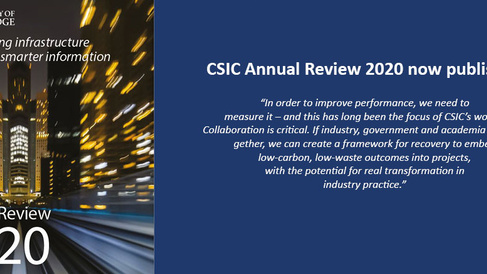
This year’s CSIC Annual Review brings focus to the use of data from real performance to enable better decision-making for reducing carbon, increasing resilience and preserving resources. The Review is now available to read and download on the CSIC website.
Acknowledging the effects of the global Covid-19 pandemic in his foreword to the Review, Andy Mitchell CBE, CEO of Tideway and Co-Chair of the Construction Leadership Council, reflects on the speed of change demonstrated as a result of lockdown restrictions, writing: “Change can happen, and it can happen very quickly… as we all work to get the industry back up and running again, we cannot and must not simply go back to doing what we were doing before, designing, building and managing infrastructure in the same way. Even incremental change is not good enough – we have to do much more for much less, and quickly.”
Addressing the urgency of the global grand challenges of zero carbon, resource constraint and resilience, and considering both the hazard and opportunity the Covid crisis brings to create a sustainable post-pandemic future, Dr Jennifer Schooling OBE, Director of CSIC, makes the case for collaborative action: “Despite the Covid-19 pandemic having a dramatic impact on all our lives, its impact on global CO2 emissions has been relatively small… Our trajectory for recovery must not return to pre-pandemic levels – we must do more.
“Collaborative action will be crucial to securing the changes required to reach net zero by 2050; the consequences for not acting now will be devastating for many. There is much to do in a short time, but the Covid-19 crisis has demonstrated that when we need to, we can overcome challenges and act quickly.”
Providing an industry perspective in his contribution to the Review, Tim Embley, Group Research & Innovation Director of Costain, highlights the importance of the sector working together to adapt, embrace and scale-up new solutions “to make yesterday’s innovation today’s norm”. He writes: “If our industry is going to build a sustainable future, we must continue to bring leading-edge solutions into practice, with technology at the front and centre in everything we do. Data is the new currency for making the right decisions and smart infrastructure is the new practice in our engineering provisions.”
The Review features a wide range of current CSIC project case studies demonstrating how CSIC works closely with partner organisations to deliver effective smart infrastructure solutions for industry. These feature applications of innovative fibre optic strain technology, including: one applied to a possible early warning system for identifying potential sinkholes; another to a unique example of monitoring performance of large under-reamed piles intercepted by tunnelling; a third to the structural monitoring of various elements of the newly completed Civil Engineering Building at the University of Cambridge.
Other case studies focus on the use of data and smart infrastructure solutions: one describes a data-driven framework to better target domestic energy policies, decarbonising domestic heating being a high priority for the route to net zero carbon; in another, CSIC researchers have been working in close collaboration with The Alan Turing Institute to optimise the use of data to support more effective urban energy policies. A further case study describes a new asset management methodology in which a line of sight from asset information to organisational objectives enables organisations to be agile in their response to extreme weather events and climate change. Another covers the development of a new digital strategy to support transport infrastructure investment and council policy goals in Cambridge to improve air quality and congestion.
Research projects are integral to CSIC’s success and this year’s Review presents a number of these including: affordable robotics to support material efficiency, productivity and sustainability in construction of concrete buildings; the development of new instrumentation and analyses to estimate seabed cable fatigue – a topic of increasing concern for the resilience of offshore wind farms; emerging sensor technologies for the structural assessment and deterioration detection of highway assets, involving a systems integration approach bringing together a range of sensing technologies, computer vision and data analytics; and a proposed inspection system based on building digital twins for monitoring building environmental conditions which has the potential for implementing smarter techniques for facilities management.
To read the CSIC 2020 Annual Review online, please visit issuu or download a PDF. To read previous CSIC Annual Reviews, please visit the Resources and Thought Leadership section.
